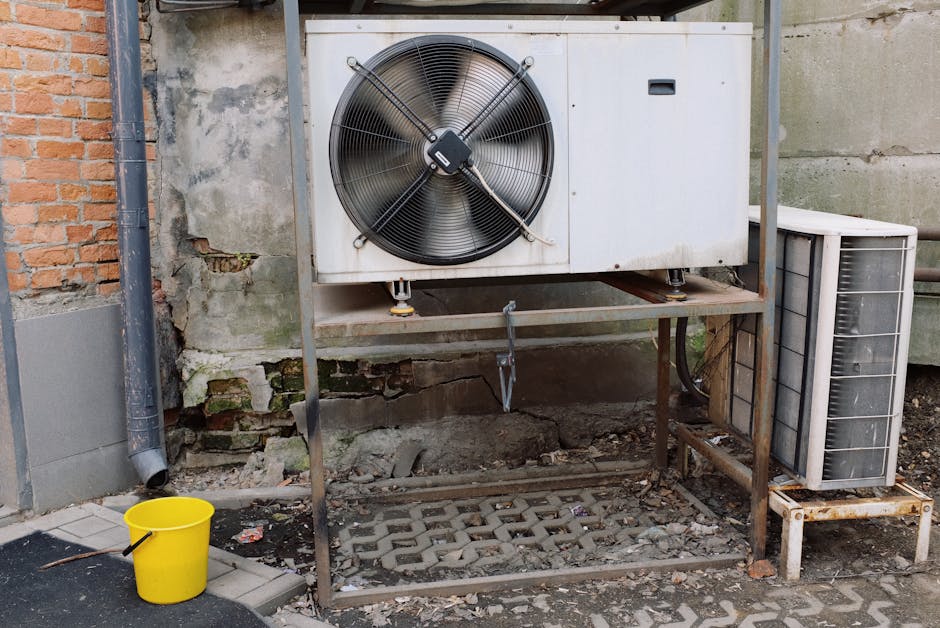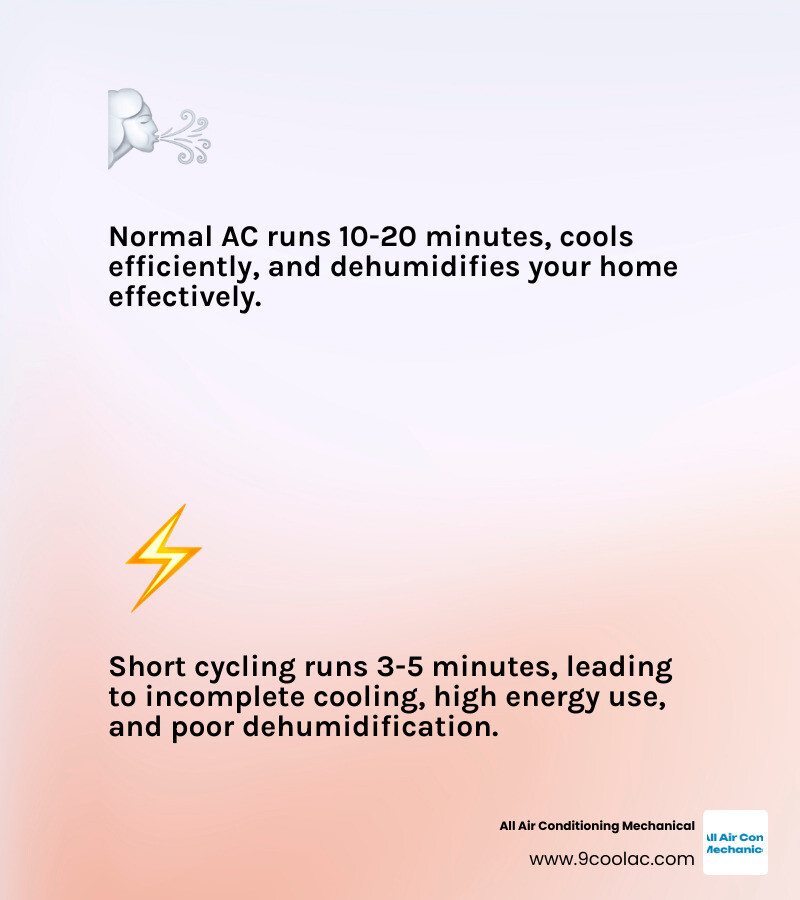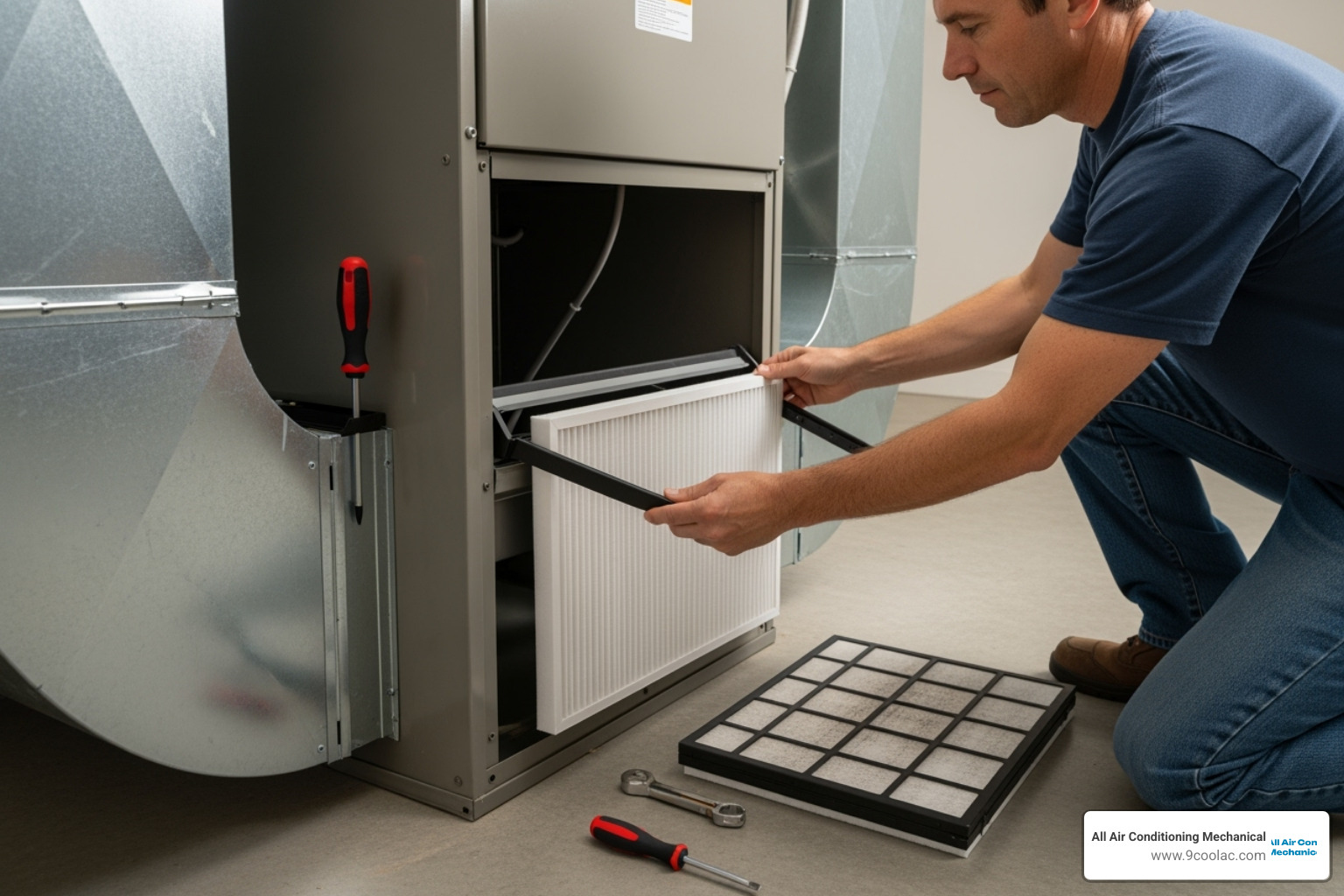
.png)
3434 W 84th St Suite 106, Hialeah, FL 33018
.avif)
Phone Number
(305) 989-4724

Office Hours
8:00am - 4:00pm Monday to Friday

License
cac1818228
© All Air Conditioning Mechanical LLC. All rights reserved.

If you're wondering how to stop short cycling ac, the quick answer is to start by replacing your air filter, checking your thermostat placement, and ensuring all vents are clear. If these simple fixes don't solve the problem, you'll likely need a professional to check for refrigerant leaks, electrical issues, or an oversized system.
Quick Steps to Stop AC Short Cycling:
Your air conditioner should run for 10-20 minutes to cool your home, then shut off. When it turns on and off every few minutes instead, that's short cycling. This problem increases energy bills, causes excessive wear on your system, and leaves your home feeling clammy because it prevents proper dehumidification.
Fortunately, many causes of short cycling have straightforward solutions. This guide will walk you through identifying why your AC is short cycling and what to do about it, from simple DIY fixes to knowing when to call in the experts.

A properly working air conditioner runs for 10 to 20 minutes at a time to thoroughly cool your home and pull moisture from the air. That's a normal cooling cycle.
Short cycling is the opposite. The system kicks on for just a few minutes, shuts off before completing the job, and then repeats the process shortly after. It never runs long enough to reach the temperature set on your thermostat or properly dehumidify the space.
Short cycling is more than just an annoyance; it creates significant problems for your comfort and your wallet.
If your AC runs for 3-5 minutes, shuts off, and then repeats the cycle, it's short cycling. Understanding how to stop short cycling ac starts with identifying the cause. For a technical discussion, see this thread: What is "short cycling" for an AC?
To learn how to stop short cycling ac, you first need to find out what's wrong. Most problems are caused by one of four issues: restricted airflow, an oversized system, low refrigerant, or a thermostat problem.

The most common cause of short cycling is also the easiest to fix. When your air filter gets clogged with dust and debris, it restricts airflow. Your system can't "breathe" properly, causing it to work harder and overheat. A built-in safety switch then shuts the unit down to prevent damage. The system cools off, turns back on, and repeats the cycle. The solution is simple: check your filter monthly and replace it every 1-3 months.
Bigger isn't always better with air conditioners. An oversized unit cools your home too quickly, satisfying the thermostat before it can complete a proper cooling cycle. While the temperature may drop, the system doesn't run long enough to remove humidity, leaving the air feeling clammy. This issue usually stems from an improper load calculation during installation. If you suspect your unit is oversized, you may want to learn the Signs Your AC Unit Needs Replacement.
Refrigerant is the substance that absorbs heat from your home. It doesn't get used up, so if your levels are low, you have a leak. When refrigerant levels drop, your AC can't transfer heat effectively. This can cause the evaporator coils to get too cold and freeze over, which blocks airflow and makes the problem worse. The strain of running with low refrigerant can also damage the compressor. Finding and fixing a refrigerant leak always requires a professional.
Your thermostat acts as the brain of your cooling system. A faulty thermostat can misread the temperature and cause short cycling. Placement is also critical. If your thermostat is in direct sunlight, near a heat-generating appliance, or too close to a supply vent, it will get an inaccurate reading of your home's temperature. This tricks it into turning the AC on or off at the wrong times. Sometimes, the issue is simply bad calibration or dead batteries. For more help, see our guide on Troubleshooting AC Thermostat Problems.
Before calling a professional, there are several simple steps you can take to resolve AC short cycling. These fixes address the most common issues and can often get your system back to normal quickly. For your safety, always turn off the power to your AC unit at the circuit breaker before performing any maintenance.

A clogged air filter is the leading cause of restricted airflow. To check it, locate the filter in the slot near your indoor air handler or inside a return air vent. Pull it out and hold it up to a light. If you can't see light through it, it's time for a replacement.
When buying a new filter, match the size printed on the frame (e.g., 16x25x1). Slide the new filter in, making sure the airflow arrow points toward the air handler. Check your filter monthly and replace it every 1-3 months, or more often if you have pets.
Your thermostat can cause erratic behavior if it's malfunctioning. First, replace the batteries if it uses them. Next, confirm your settings are correct: the mode should be on "Cool" and the fan on "Auto."
Then, check the thermostat placement. Is it in direct sunlight, above a hot lamp or TV, or right in the path of a supply vent? Any of these can give it a false temperature reading, causing the AC to turn on or off prematurely. If the location is problematic, try shielding it or consider having it moved to a more suitable spot on an interior wall. For more tips, review our guide on Troubleshooting AC Thermostat Problems.
Proper airflow requires clear pathways for air to circulate. Walk through your home and check all supply vents (where cold air blows out) and return air vents (larger grilles that pull air in). Move any furniture, curtains, or other objects that are blocking them. Obstructed vents create pressure imbalances that can cause your system to overheat and short cycle. Also, use a vacuum's brush attachment to clean any dust and debris from your return air vents.
While DIY fixes can solve many common problems, some causes of short cycling require the expertise of a trained HVAC professional. If you've tried the basic troubleshooting steps without success, or if you notice any of the following warning signs, it's time to call for help. Attempting to fix complex issues yourself can be dangerous and may lead to further damage. For an overview of common issues, see these Quick Solutions for Common AC Problems.
If you suspect a refrigerant leak, this is a job for a professional. Handling refrigerant requires certification and can be hazardous.
Signs of a leak include hissing sounds from your AC unit, ice on your coils, and a general lack of cooling. A technician will use specialized electronic tools for professional leak detection to find the source of the leak. After repairing it, they will safely recharge your system with the correct amount of refrigerant, restoring its efficiency and stopping the short cycling. If you're in Pembroke Pines, we can help with AC Repair Pembroke Pines, FL.
Electrical work on an AC unit should only be performed by a qualified technician due to the risk of electric shock. Faulty capacitors, which help start the motors, or worn wiring can cause intermittent power and trigger short cycling.
Similarly, compressor issues require professional diagnosis. The compressor is the heart of your AC system, and if it's failing, it can't circulate refrigerant properly. Unusual noises or a lack of cooling are common symptoms. Addressing these problems early can save you from a very expensive replacement. For expert help with these issues in Doral, we offer AC Repair Doral, FL.
If you've ruled out other causes, you may be dealing with an oversized AC unit. This problem requires a professional assessment.
A technician will perform a professional load calculation, a detailed analysis of your home's square footage, insulation, windows, and other factors to determine your exact cooling needs. If the unit is confirmed to be too large, the most effective long-term solution is replacing it with a properly sized system. A correctly sized unit will run more efficiently, provide better dehumidification, and last longer, making it a worthwhile investment in your home's comfort. If you're in Miramar and need your system evaluated, contact us for AC Repair Miramar, FL.
Regular maintenance is the best way to prevent problems like short cycling before they start. Your AC is a complex machine that benefits from annual professional attention, ideally in the spring before summer begins.
During a seasonal tune-up, a technician performs a thorough inspection and cleaning to keep your system running efficiently. Key tasks include:
This proactive approach prevents future issues and extends system longevity. A well-maintained AC unit runs more efficiently, requires fewer emergency repairs, and lasts years longer than a neglected one. An annual tune-up is a small investment that pays for itself in reliability and peace of mind. To keep your system in peak condition, explore our HVAC Services.
Here are answers to some common questions about this frustrating issue to help you understand how to stop short cycling ac.
A healthy AC unit should run for 10 to 20 minutes per cycle. This allows it to cool your home and remove humidity effectively. The exact duration depends on factors like the outside temperature, your thermostat setting, and your home's insulation. However, if your system consistently runs for only 3-5 minutes at a time, it is likely short cycling.
Yes, absolutely. The compressor is the heart of your AC system and its most expensive component. It experiences the most mechanical stress during startup. When an AC short cycles, the compressor is subjected to this high-stress startup phase over and over again. This increased wear and tear can lead to premature failure and a very costly repair.
A smart thermostat can help in some cases, but it is not a universal solution. Its benefits include more precise temperature control and learning algorithms that can optimize run times, potentially smoothing out cycles caused by minor temperature fluctuations.
However, a smart thermostat cannot fix underlying mechanical or airflow problems. If your AC is short cycling due to a refrigerant leak, a clogged filter, or an oversized unit, the problem will persist. It's a great tool for optimization, but it's no substitute for addressing the root cause of the issue. For thermostat-related AC repair needs in your area, we offer AC Repair Medley, FL.
When your AC constantly starts and stops, it's a clear sign that something needs attention. As we've covered in this guide on how to stop short cycling ac, many common causes—like a clogged filter or blocked vents—are simple DIY fixes.
However, deeper issues like refrigerant leaks, electrical faults, or an oversized system require professional expertise. Ignoring short cycling leads to higher energy bills, a clammy home, and unnecessary strain on expensive components like the compressor. What seems like a minor annoyance can quickly become a costly breakdown.
Regular maintenance is the best way to prevent these problems from occurring in the first place. If you've tried the DIY solutions and your AC is still short cycling, it's time to call in the experts. At All Air Conditioning Mechanical, we have the experience to diagnose the root cause and implement a lasting solution.
Your home should be a cool, comfortable sanctuary. Let us solve your short cycling problem and restore your peace of mind. Contact us for expert air conditioning repair in Hialeah, FL, and we'll get your AC running reliably and efficiently.